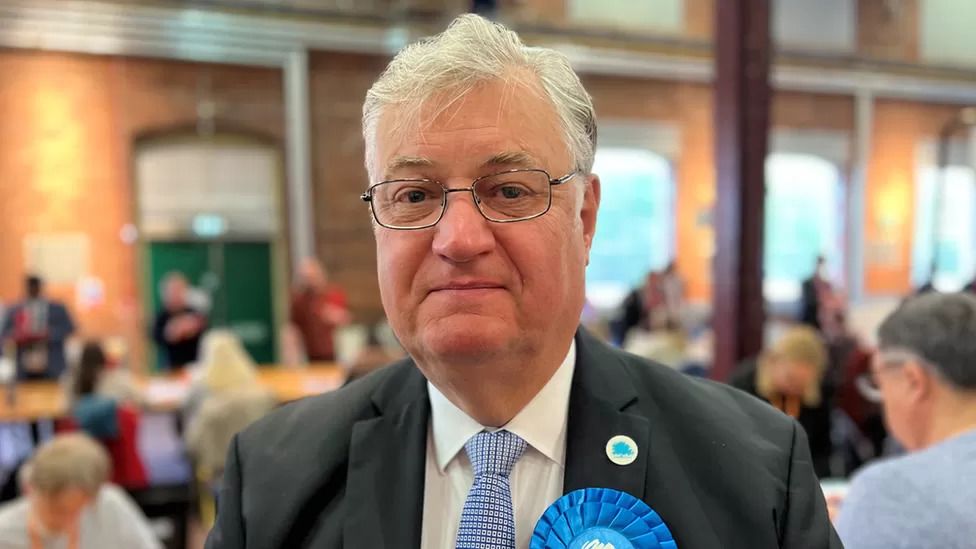
Local elections 2023: Tory losses a clear rejection of Rishi Sunak, says Labour
Labour leader Sir Keir Starmer claimed his party was on course to win the next general election, expected next year.
The Tories lost 48 councils and more than 1,000 councillors across England in Thursday's polls, exceeding their worst predictions.
Many Tories were angry at the scale of the losses, with some blaming Mr Sunak.
Labour says it is now the largest party in local government, surpassing the Tories for the first time since 2002.
"The British public has sent a clear rejection of a prime minister who never had a mandate to begin with," a Labour spokesperson said.
The Liberal Democrats had what their leader Sir Ed Davey said was their "best result in decades", taking control of 12 councils, mostly in Tory heartlands. The party gained 405 new councillors, compared with Labour's 536 gains.
The Green Party gained 241 seats - their best-ever result in local elections - and gained its first majority on an English council, in Mid-Suffolk, although they were overtaken as the biggest party by Labour in Brighton and Hove.
Mr Sunak admitted the results were "disappointing", but said he did not detect "a massive groundswell of movement towards the Labour Party or excitement for its agenda".
Sir Keir claimed the "fantastic" results showed his party was well placed to oust the Tories from government in a general election, expected next year.
"Make no mistake, we are on course for a Labour majority at the next general election," he told cheering activists in Medway in Kent, one of the councils his party has wrested from the Tories.
'Little short of calamitous'
Labour won control of councils in areas that will be crucial battlegrounds in the general election, including Medway, Swindon, Plymouth, Stoke-on-Trent, and East Staffordshire.
The BBC's projected national vote share put Labour on 35%, the Tories on 26% and the Lib Dems on 20%.
Labour's projected nine-point lead represents its largest over the Conservatives on this measure since the party lost power in 2010.
Sir John Curtice, the polling expert, said this year's results were "only a little short of calamitous for the Conservatives".
But the BBC's political editor, Chris Mason, said the results suggested it would be hard for either the Conservatives or Labour to be confident of winning a majority at the next general election.
Labour shadow cabinet member Peter Kyle denied the results, which saw the Lib Dems gain nearly as many new councillors as Labour, was an anti-government, rather than a pro-Labour, vote.
He told BBC Radio 4's Today programme the results showed Labour had won back support in "key places" and would win an outright majority at the general election, without needing to do deals with other parties.
"In all of the areas that the Labour Party targeted, that we focused resources, that we really wanted to reconnect to voters, we did so."
He added that Sir Keir Starmer had "led from the front" and Labour had run a "disciplined" campaign, which showed it was "moving towards government."
Tory recriminations
In Swindon, where Labour took control of the borough council for the first time in 20 years, ousted Tory council leader David Renard blamed "the cost of living and the performance of the government in the last 12 months" for his party's woes locally.
Mr Renard said although the prime minister had "started to stabilise things", for voters in Swindon "what had gone on before that was something that they didn't like".
 David Renard, Swindon's former council leader, who lost his own seat
David Renard, Swindon's former council leader, who lost his own seat
The Conservative mayor of the Tees Valley, Ben Houchen, who is up for election next year, said the poor Tory performance was a partly a result of "the turmoil and upheaval of the last 12 months".
He said Labour had been "successful in making this a referendum on the government", adding "people don't feel like they can vote for us".
Nigel Churchill, a former Tory councillor who lost his seat on Plymouth Council - another Labour target - said "I think we can safely say" the Conservatives will lose the next general election.
"The general public do not trust them at the moment," he said.
But Education Minister Robert Halfon said this year's local elections were always "going to be difficult" for his party.
He said internal party divisions "didn't help", but claimed the losses were down to external factors, such as the cost-of-living crisis and problems in the NHS.
"Every government during the mid-term, especially a government that has been in power for 13 years, always suffers losses in local elections," he said.
Other Tory MPs told the BBC that apathy - Conservative voters staying at home - was also a big problem for the party.
Key results at a glance:
* Labour has gained 536 councillors and 22 councils - including the key battlegrounds of Swindon, Plymouth, Medway and Stoke-on-Trent, where the party are hoping for success at the next general election
* The Conservatives lost 1,061 councillors and 48 councils, but won control of Torbay and Wyre Forest
* The Liberal Democrats have gained 12 councils and 405 councillors, including the former Conservative strongholds of Windsor and Maidenhead, and Stratford-on-Avon
* Almost 250 Green councillors were elected, and the party won its first-ever outright majority on a council in Mid Suffolk
The seats up for grabs were mostly on district councils, responsible for services including bin collections, parks, public housing and planning applications.
The rest of the elections were for a mixture of metropolitan and unitary councils - single local authorities that deal with all local services - and for four mayors.
The elections were the first in England to see voter ID checks at polling stations. Some voters told the BBC they were turned away from polling stations, prompting critics to call for the ID rules to be dropped.











